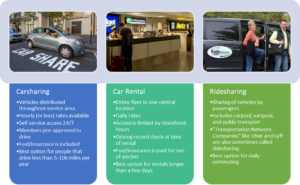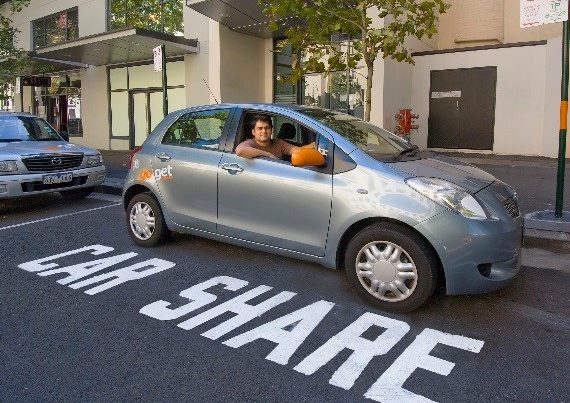MAST has released a new report titled Carsharing: An Alternative to Private Vehicle Ownership, which includes background information about carsharing, three detailed case studies, and recommended next steps for determining the feasibility of carsharing in the Monadnock Region. To access the full report, click here.
What is Carsharing?
Carsharing is a transportation option that offers the benefits of having access to a car without the cost or obligations associated with private ownership. It’s a usage-based rental service that gives members access to a dispersed network of shared vehicles throughout a campus, community, or region at unattended, self-serve locations. Membership in a carshare organization generally involves a sign-up fee in addition to a pre-qualification process that requires a valid driver’s license and a clean driving record. Once membership is established, vehicles are reserved online, through use of an app, or with a phone system.
Carshare vehicles can be used for 15 minutes up to several days. Members are charged a monthly fee plus an hourly or mileage based rate. Insurance, fuel, maintenance, parking and sometimes roadside assistance are typically included. Most carshares offer a variety of vehicles including sedans, trucks, and vans to meet the diverse needs of their members. Once a member is finished with a vehicle, it is then returned to its designated parking spot so that it will be available for the next user.

Carsharing is often confused with other mobility options such as traditional car rentals and ridesharing, but each has a distinct list of benefits and challenges. Rather than competing with each other, each mobility option fills a niche in addressing the transportation needs of the community.
What are the Benefits of Carsharing?
Carsharing benefits both individual users and the larger community. A partial list of the benefits of carsharing is including below.
> Cost Savings
A major benefit of carsharing is cost savings. Because membership fees and hourly/mileage fees are generally low, and because costs like purchase cost, insurance, fuel, and maintenance are covered by the carshare’s operator, carsharing can also bring mobility to individuals and families that may not be able to afford private car ownership. Cost savings are highest for members that drive between 5,000 and 10,000 miles (or less) per year (Bringing Car-Sharing, n.d.).
Businesses can also benefit from carsharing by augmenting or replacing their own fleet with carshare vehicles.
> Physical Activity & Health Benefits
Private car use is linked to physical inactivity, whereas carsharing often involves active transportation like walking or biking to get to and from the vehicles. Studies show that carshare members are more likely to walk or bike for short trips, leading to increased physical activity and better health outcomes (Matte, 2015).
> Environmental Benefits
Carsharing has been shown to decrease our collective dependence on fossil fuels. Even though it increases vehicle miles traveled (VMT) for some individuals and families who couldn’t drive before, it reduces VMT overall, since it also enables people who previously owned private vehicles to drive less. Studies show that since access to carsharing services reduces private car ownership, every carsharing vehicle replaces approximately 9 to 13 cars on the road in urban areas, resulting in congestion and parking relief (Martin & Shaheen, 2011).
Who uses Carsharing?
Carsharing is attractive to individuals and families who only make occasional use of a vehicle as well as others who would like access to a vehicle of a different type than what they use day-to-day. Members tend to be located in or near neighborhoods with medium to high population densities or college campuses. The majority of users are young adults age 25 to 45. They tend to be single or childless couples that rent their homes with high levels of education and a middle to upper class income.
Sources
- City Carshare. (n.d.). Bringing Car-Sharing to Your Community. Retrieved from http://www.communauto.com/images/03.coupures_de_presse/CCS_BCCtYC_Long.pdf
- Martin, E., & Shaheen, S. (2011, December 01). Greenhouse Gas Emission Impacts of Carsharing in North America (journal article). Retrieved from http://tsrc.berkeley.edu/ghgemissionimpacts
- Matte, C. M., (2015, September). The Social Factors That Influence the Success of Rural Carshare Operations in the Kootenay Region of British Columbia, Canada (Master’s Thesis). Retrieved from http://dspace.royalroads.ca/docs/handle/10170/784
